How Much Do Tennis Shoes Weight: Tennis shoes typically weigh between 8 to 14 ounces (225 to 397 grams). This weight range is common for most tennis shoe models available in the market.
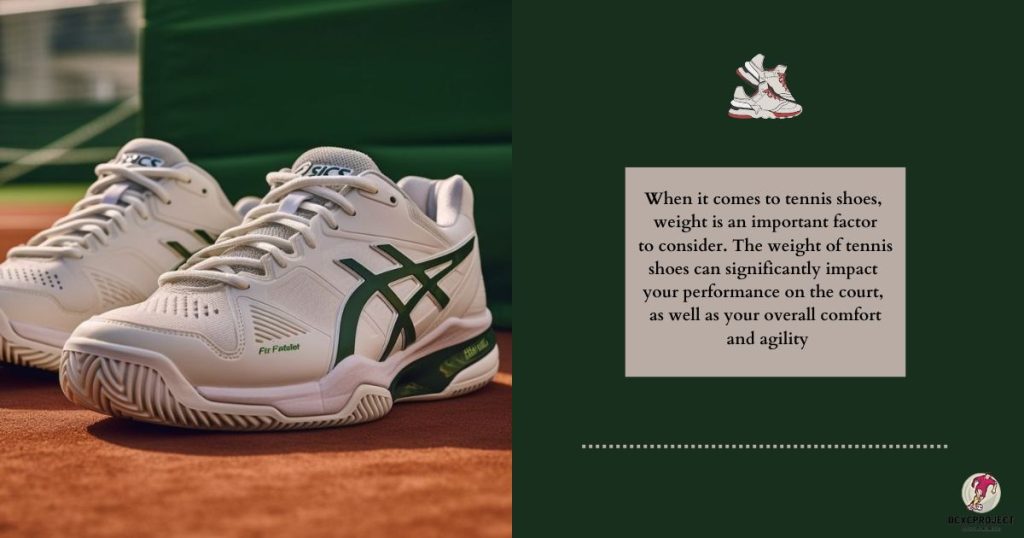
Factors That Influence The Weight Of Tennis Shoes
How Much Do Tennis Shoes Weight: When it comes to tennis shoes, weight is an important factor to consider. The weight of tennis shoes can significantly impact your performance on the court, as well as your overall comfort and agility. Understanding the factors that influence the weight of tennis shoes can help you make an informed decision when purchasing a new pair. Below are some key factors to consider:
Materials Used
The materials used in the construction of tennis shoes play a major role in determining their weight. Different parts of the shoe, such as the upper, midsole, and outsole, may be made from various materials, each with its own weight characteristics. For example, shoes with uppers made from lightweight mesh or synthetic materials tend to be lighter compared to those made from leather. Similarly, the type of cushioning material used in the midsole can also affect the weight of the shoe. Shoes with lightweight foam or gel cushioning are generally lighter than those with heavier materials like rubber or EVA foam.
Design Features
The design features of tennis shoes can also contribute to their weight. Certain design elements, such as extra layers of support or added stability features, can add weight to the shoe. Additionally, shoes with more padding and cushioning tend to be heavier compared to minimalist or low-profile options. It’s important to consider the specific design features that are important to your playing style and foot type, as they can affect both the weight and performance of the shoe.
Type Of Shoe
How Much Do Tennis Shoes Weight and type of shoe: The type of tennis shoe you choose can significantly impact its weight. Different types of tennis shoes, such as court shoes, clay court shoes, and all-court shoes, are designed for specific playing surfaces and have different weight characteristics. For example, clay court shoes often have a more lightweight and flexible construction to enhance agility on clay surfaces, while all-court shoes may have additional durability features that add weight. Understanding the specific requirements of your playing surface can help you choose a shoe that strikes the right balance between weight and performance.
Brand And Model
The brand and model of the tennis shoe can also influence its weight. Different brands may use unique materials and design techniques that result in variations in weight. Additionally, within a brand, different models may have different weight characteristics based on their intended use and target audience. It’s worth exploring different brands and models to find the right combination of weight, performance, and comfort for your individual needs.
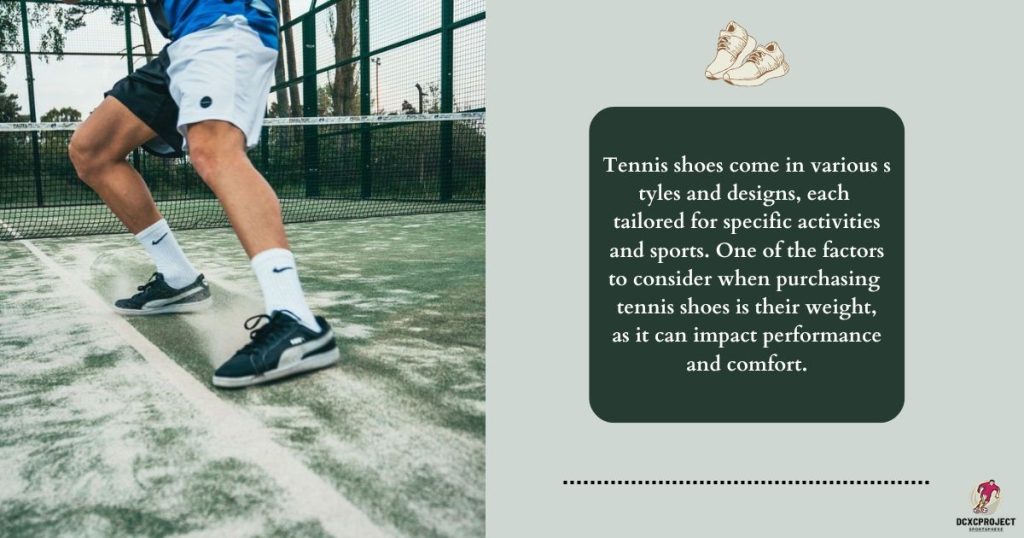
Average Weight Of Different Types Of Tennis Shoes
How Much Do Tennis Shoes Weight: Tennis shoes come in various styles and designs, each tailored for specific activities and sports. One of the factors to consider when purchasing tennis shoes is their weight, as it can impact performance and comfort. In this section, we will explore the average weight of different types of tennis shoes, including running shoes, court shoes, cross-trainers, and hiking shoes.
Running Shoes
Running shoes are designed to provide cushioning and support for athletes engaged in running or jogging activities. They are typically lightweight to promote agility and reduce fatigue during long-distance runs. The average weight of running shoes can vary depending on factors such as shoe size and brand. However, most running shoes range from 8 to 12 ounces (227 to 340 grams), making them one of the lightest types of tennis shoes available.
Court Shoes
Court shoes are specifically designed for sports such as tennis, basketball, and volleyball. These shoes offer stability, lateral support, and traction to enhance performance on hard court surfaces. Court shoes tend to be slightly heavier than running shoes due to their additional features. On average, court shoes weigh between 10 to 14 ounces (283 to 397 grams), providing the necessary support required for quick lateral movements and abrupt changes in direction.
Cross-trainers
Cross-trainer shoes are versatile and suitable for a wide range of physical activities, including gym workouts, aerobics, and cross-training exercises. These shoes are designed to handle multidirectional movements, providing stability and cushioning for various activities. The average weight of cross-trainers falls within the range of 9 to 13 ounces (255 to 369 grams), striking a balance between support and lightweight construction.
Hiking Shoes
Hiking shoes are specifically designed for outdoor activities, providing stability, traction, and protection on rugged terrains. They are built with robust materials to withstand rough environments and offer ankle support for added safety. Due to their durable construction, hiking shoes are generally heavier compared to other types of tennis shoes. On average, hiking shoes weigh between 12 to 16 ounces (340 to 454 grams), ensuring durability and support during challenging hikes.
While the average weights provided offer a general guideline for each type of tennis shoe, it’s important to note that individual shoe models within each category may vary. Additionally, personal preferences and specific performance requirements may influence the ideal weight of tennis shoes for each individual.
In conclusion,
Understanding the average weight of different types of tennis shoes can help you make an informed decision when purchasing footwear for your specific needs. Whether you’re a runner, athlete, or outdoor enthusiast, knowing the weight range that suits your activities can enhance your overall performance and comfort level.
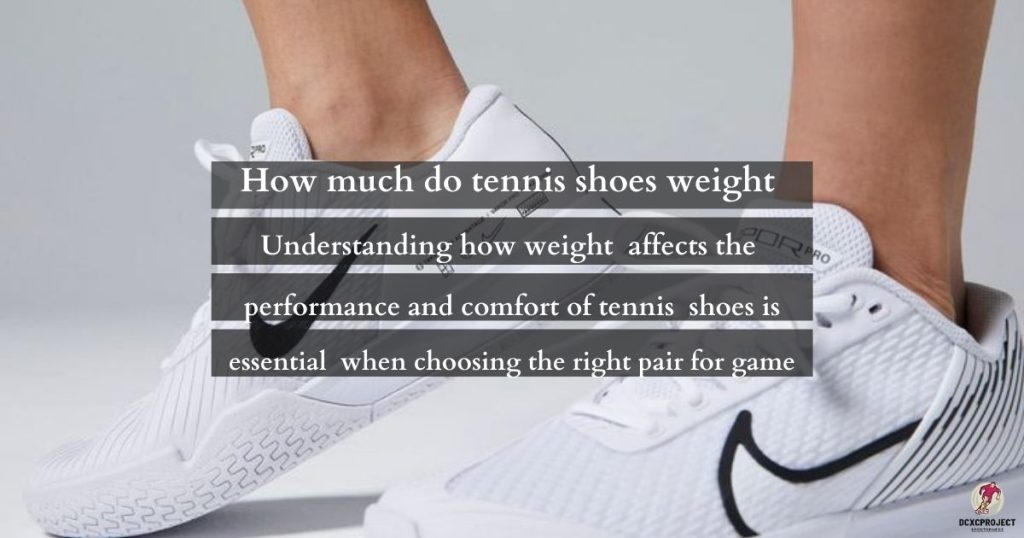
How Weight Affects Performance And Comfort
How Much Do Tennis Shoes Weight: Understanding how weight affects the performance and comfort of tennis shoes is essential when choosing the right pair for your game. The weight of tennis shoes can impact various aspects of your play, such as speed, agility, foot stability, and support. Additionally, finding a pair with the proper fit is crucial to ensure optimal performance and prevent discomfort or injuries. Let’s explore each of these factors in more detail:
Impact On Speed And Agility
The weight of tennis shoes plays a significant role in determining your speed and agility on the court. Lightweight shoes are generally preferred by players who prioritize quick movements and swift changes of direction. Their lighter weight allows for faster footwork and reduced fatigue during extended matches.
On the other hand, heavier shoes may provide additional stability and cushioning, which can be beneficial for players seeking more support and shock absorption. However, it’s essential to strike a balance between weight and stability to avoid feeling restricted or weighed down by the footwear.
Effect On Foot Stability And Support
How Much Do Tennis Shoes Weight and effect on foot stability and support: The weight of tennis shoes can influence the level of foot stability and support they provide. Lightweight shoes are often designed with minimalistic features and materials, offering a more natural feel and flexibility. While these shoes may lack some of the built-in support and stability features, they allow for greater freedom of movement and a closer connection to the court surface.
On the other hand, heavier shoes often incorporate more robust support technologies, such as reinforced midsoles and additional ankle support. These features can provide enhanced stability, particularly for players who tend to overpronate or have weaker ankles. However, it’s crucial not to sacrifice comfort and flexibility for the sake of added stability, as it can hinder your overall performance.
Importance Of Proper Fit
One of the most critical factors in choosing tennis shoes is selecting a pair that fits properly. A well-fitted shoe ensures optimal comfort, prevents foot fatigue, and reduces the risk of injuries. When trying out tennis shoes, pay attention to the following fit considerations:
- Length: Your toes should have enough room to wiggle without feeling cramped, but there shouldn’t be excessive space at the front of the shoe either.
- Width: Ensure the shoe offers a snug fit without putting pressure on the sides of your feet. It shouldn’t feel too tight or too loose.
- Arch support: Consider your foot arch type and choose a shoe that provides adequate support and alignment for your specific needs. This can help prevent discomfort and injuries such as plantar fasciitis.
- Ankle support: Depending on your playing style and personal preference, select a shoe that offers the desired level of ankle support. High-top shoes provide more stability, while low-top shoes allow for greater mobility.
Remember, each player has unique foot characteristics and playing styles, so what works for others may not work for you. Be sure to try on different brands and models to find the perfect fit that aligns with your specific needs and preferences.
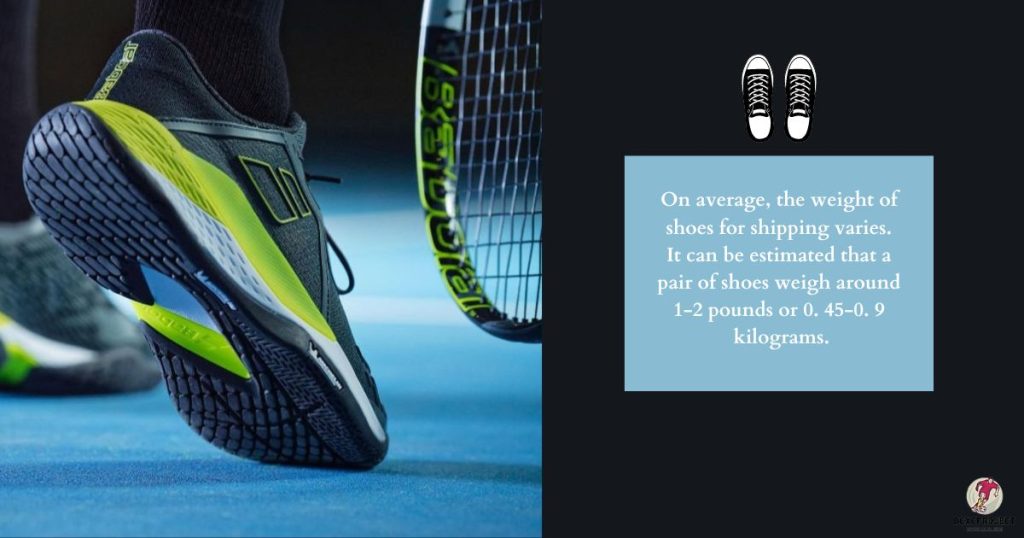
Frequently Asked Questions For How Much Do Tennis Shoes Weight
How Much Do Sneakers Weigh In Pounds?
Sneakers weigh approximately 1-3 pounds.
How Much Do Shoes Weigh For Shipping?
On average, the weight of shoes for shipping varies. It can be estimated that a pair of shoes weigh around 1-2 pounds or 0. 45-0. 9 kilograms.
What Is The Average Weight Of A Pair Of Shoes?
On average, a pair of shoes weighs around 2 to 3 pounds.
How Many Ounces Does A Tennis Shoe Weigh?
A tennis shoe typically weighs around 11 ounces.
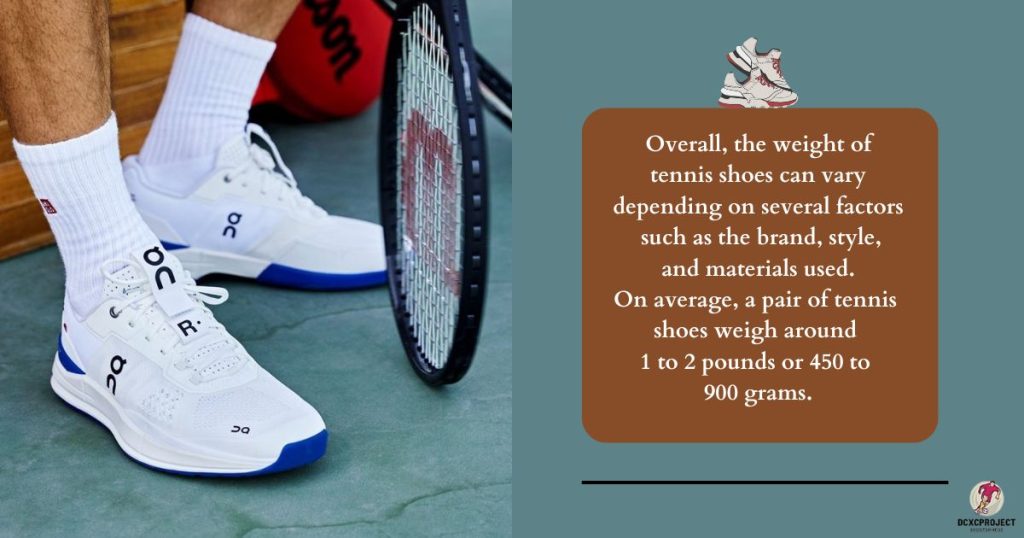
Conclusion: How Much Do Tennis Shoes Weight
How Much Do Tennis Shoes Weight: Overall, the weight of tennis shoes can vary depending on several factors such as the brand, style, and materials used. On average, a pair of tennis shoes weigh around 1 to 2 pounds or 450 to 900 grams. However, it’s important to note that this is just an estimate and individual shoes may weigh more or less.
If you’re specifically looking for lightweight tennis shoes, they can weigh as little as 8 ounces or 227 grams. Ultimately, the weight of tennis shoes plays a role in comfort and performance for athletes, so it’s important to find the right balance for your needs.
